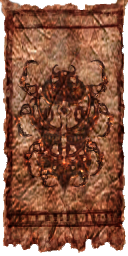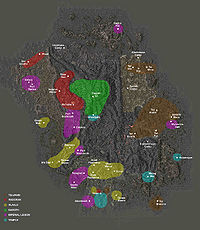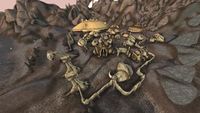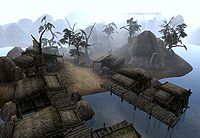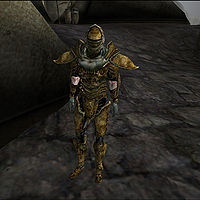Lore:Casa Redoran
- A Casa Redoran premia as virtudes dos deveres, importância, e piedade. Dever é a própria honra de alguém, e para a família e clã. Importância é a seriedade essencial da vida. A vida é difícil, e eventos devem ser julgado, dotados, e refletidos sobre com próprio cuidado e seriedade. Piedade é o respeito pelos deuses, e as virtudes que eles representam. Uma vida leve, sem cuidados, não é válida de se viver. — Grandes Casas de Morrowind
Casa Redoran é uma das cinco Grandes Casas remanescente dos Dunmer. Ela governa o Distrito Redoran do noroeste de Morrowind da cidade de Luz Negra, próximo da fronteira com Skyrim. No distrito de Vvardenfell, o assento do conselho da Casa era localizado em Ald'ruhn, e todos os conselheiros moravam lá na couraça oca de um colossal Imperador Caranguejo pré-histórico, no distrito conhecido como Ald'ruhn-sob-Skar. Outras cidades de domínio Redoran em Vvardenfell incluiam Khuul, Maar Gan e Ald Velothi.
O principal foco da Casa Redoran é manter as tradições dos Dunmers e, mais especificamente, o caminho do guerreiro. Devido a esse foco, o Templo do Tribunal era um aliado natural. Também existe um respeito mútuo entre eles e a Guilda dos Lutadores e a Legião Imperial. Eles possuem menos respeito pelas outras instituições Imperiais, tais como a Guilda dos Magos, a Guilda dos Ladrões, e a religião do Culto Imperial.
The True Nobles
- A Redoran's duty is first to the Tribunal Temple, second to the Great House Redoran, and third to one's family and clan. A Redoran noble must know the virtue of gravity. It is not the Redoran way to laugh at serious matters, for it shows disrespect. It is not the Redoran way to spread rumors, for they fester and breed dissention [sic].
Redoran settlements are designed in the Dunmer village style, built of local materials, with organic curves and undecorated exteriors inspired by the landscape and by the shells of giant native insects. Redoran villages are typically centered on Temple compounds and their courtyards, with huts and tradehouses gathered around a central plaza, as in the West Gash village of Gnisis, which was, for a time, rented to the Imperial Legions.
Conflicts often arise with the other Great Houses. The most obvious conflict during the late Third Era was centered on the town of Caldera that was founded by the Imperial Caldera Mining Company with the support of House Hlaalu. There was also bickering with the Telvanni concerning the founding of certain new settlements in the Ashlands.
House Redoran's leader as of the late Third Era, Bolvyn Venim, was somewhat unscrupulous for a Redoran. Few among the rest of the hierarchy actually liked him, but the Redoran respect for strong leadership (which few Redoran leaders have displayed in recent history to that point, hence the weakness of the house during the time) and prowess in arms ensures that he nevertheless retained his position. He was influential in securing Redoran's share of the frontier lands when Vvardenfell was opened for settlement in 3E 414, and moved the council to Ald'ruhn as a result.
The Rise of the Redoran
During the Oblivion Crisis, the Empire pulled a vast majority of the Legions out of Morrowind to deal with the gates opening in their homeland of Cyrodiil. The Dunmer had no standing army at the time, and the armies of daedra destroyed the Redoran city of Ald'ruhn. The destruction of their ancestral city, coupled with their historic status as "the hereditary defenders of the Morrowind", led to House Redoran taking charge, and they were slowly able to raise an army.
After the Oblivion Crisis, the house started to rebuild. However, in 4E 5, the Red Year brought further destruction to Morrowind. All of the settlements on Vvardenfell were obliterated. The Redoran councilor living in Mournhold at the time coordinated the relief effort, issuing a directive to send soldiers, supplies and able-bodied mer to the settlements which were hit the hardest. Shortly after the eruption of Red Mountain, Morrowind came under siege from the Argonians of Black Marsh. While the Argonians were able to decimate the south and east of mainland Morrowind, the army of House Redoran prevented them from progressing further into the north and west.
The political affairs surrounding the Oblivion Crisis and the Red Year culminated in a power vacuum, as House Hlaalu was unceremoniously dismissed from the Grand Council. Animosity between Hlaalu and Redoran increased, as House Redoran seized the opportunity and became the leading power in what remained of Morrowind, taking the position that Hlaalu had held for centuries due to their close ties with the Empire. The Hlaalu believe that Redoran were directly involved in the reorganization of the council, and have held a grudge against them ever since. Subsequently, Redoran relocated the capital of Morrowind to Blacklight, as Mournhold had been sacked by the Argonians.
Solstheim and House Redoran
In 4E 16, the High King of Skyrim gave the island of Solstheim to Morrowind as a refuge, and it passed into the control of House Redoran (though the Telvanni established their own settlement, Tel Mithryn, on the southeast coast). House Redoran benefited from the mining of ebony there until 4E 181, when the mine at Raven Rock was closed. House Redoran's neglect of Solstheim increased, as without the mine, the island not only held little economic or strategic importance compared with the other seventy-three outlying settlements of Morrowind, but was a significant source of casualties for the Redoran Guard (they lost twenty-six guards in a two-year span). However, in 4E 201, the mine reopened, and House Redoran took a renewed interest.
Gallery
-
Ald'ruhn, the district seat of House Redoran on Vvardenfell, as seen in Morrowind
-
The Redoran village of Khuul, as seen in Morrowind
-
A Redoran Guard, as seen in Morrowind
-
DB-place-Raven Rock.jpg
The Redoran town of Raven Rock, as seen in Dragonborn
-
DB-npc-Lleril Morvayn.jpg
Redoran Councilor Morvayn, as seen in Dragonborn
-
DB-npc-Redoran Guard.jpg
A Redoran Guard, as seen in Dragonborn
See Also
- For more information, see the Morrowind article.
Books
- The Hope of the Redoran de Turiul Nirith — A tale of a child blessed by a prophesy and the interpretation thereof
- Redoran Cooking Secrets — How to cook "Crab Meat and Scuttle" and "The Hound and Rat"
- The True Noble's Code de Serjo Athyn Sarethi — Gives the guidelines to the members of the House Redoran

